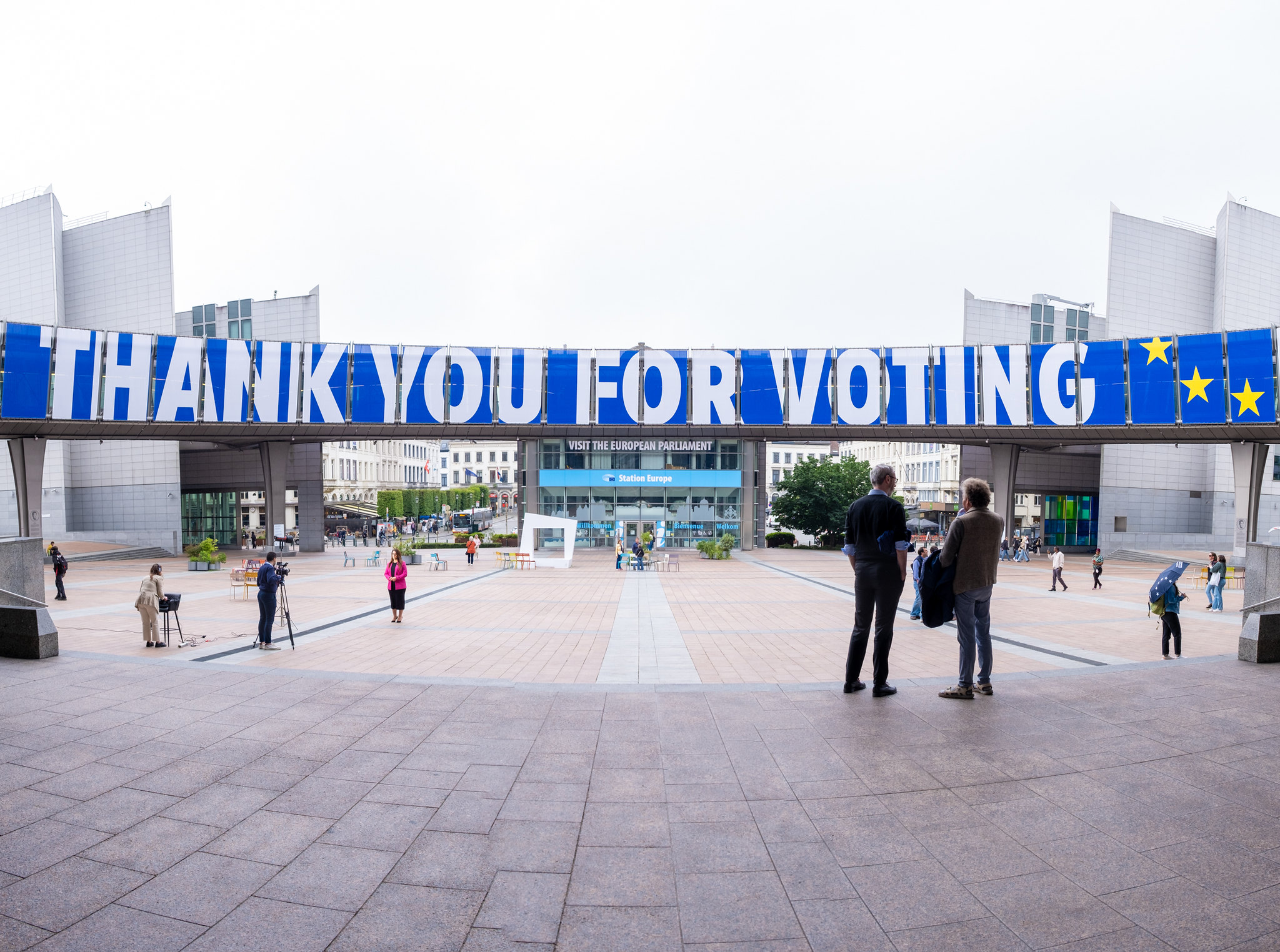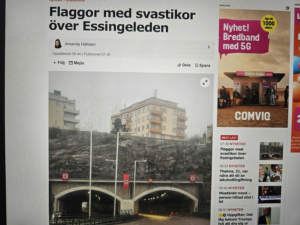Patriots for Europe
This just recently announced project, presented by Herbert Kickl (Freiheitliche Partei Österreichs), Andrej Babiš (Akce Nespokojených Občanů, ANO), and Victor Orbàn (Fidesz) now indeed became the largest of the far-right and the third largest of all groups in the plenary. It is formed by 84 Members of Parliament (MEPs) representing 14 parties from 12 countries.
The member parties are (number of MEPs in brackets):
- Rassemblement National (30) – France
- Vlaams Belang (3) – Belgium
- Partij voor de Frijheid (6) – Netherlands
- Lega (8) – Italy
- Vox (6) – Spain
- Ano 2011 (7) – Czech Republic
- Přísaha (1) – Czech Republic
- Motoristé sobě (1) – Czech Republic
- Fidesz (11) – Hungary
- Freiheitliche Partei Österreichs (6) – Austria
- Latvija pirmajā vietā (1) – Latvia
- Phoní Loyikís (1) – Greece
- Chega (2) – Portugal
- Dansk Folkeparti (1) – Denmark
President: Jordan Bardella (RN)
Looking at its composition, it’s an amplification of the former group ID, which itself was an enlargement of the former group Europe of Nations and Freedom. That constitutes quite a line of development, but it comes at a cost. It now incorporates two clearly separated camps regarding the Russian aggression in Ukraine or, more generally, exterior orientation. While Spanish Vox and Dutch PVV are against Russia, with the PVV even outspokenly positioned in favor of Ukraine, parties like Hungarian Fidesz, Italian Lega, and Austrian FPÖ are clearly leaning towards Russia. Another rupture line could be all the tactical maneuvering of the RN ahead of the elections. It became most apparent that for the RN, all this grouping in the EP is strategically subordinated to its national power takeover plans.
European Conservatives and Reformists
The ECR group is entering its fourth consecutive legislature. What seems to be quite a continuity is more of a formal nature because its membership has changed massively over time. Although it’s still not a pure far-right group, it has evolved significantly in that direction, making it most justified to call it far-right dominated. After losing the Spanish Vox at the last minute, it is now formed by 78 MEPs, at least 65 of whom belong to far-right parties. It is the fourth-largest group in the EP.
The far-right member parties are (number of MEPs in brackets):
- Elliniki Lysi (2) – Greece
- Alianța pentru Unirea Românilor (5) – Romania
- Domovinski pokret (1) – Croatia
- ex-Ronconquête (4) (Divers droite: Nicolas Bay, Guillaume Peltier; Mouvement conservateur: Laurence Trochu; indépendant: Marion Maréchal) – France
- Fratelli d’Italia (24) – Italy
- Prawo i Sprawiedliwość (19) – Poland
- Sverigedemokraterna (3) – Sweden
- Εθνικό Λαϊκό Μέτωπο (Ethnikó Laïkó Métopo) (1) – Greece
- Nacionālā apvienība (2) – Latvia
- Jaak Madison (partyless) (1) – Estonia
- Danmarksdemokraterne (1) – Denmark
- Perussuomalaiset (1) – Finland
- Има такъв народ, ИТН, Ima takav narod (ITN, There is such a people) (1) – Bulgaria
Presidents: Nicola Procaccini (FdI), Joachim Brudziński (PiS)
The ECR will probably lose quite a few members due to its diversity. Some of those right-wing conservative parties will (have to) leave whenever something new and scandalous involving the far-right camp arises. From Romania and Lithuania, there are even two different parties each, another possible source of incompatibility. On the programmatic level, there is an interesting coexistence of an anti-EU-integrationist camp represented by the Italian FdI and Polish PiS and a pro-EU-integrationist camp, like the Bulgarian ITN. Ideologically, the ethnicist-racist Greek EL and Croatian DP probably constitute the far-right end of the spectrum.
Europe of Sovereign Nations
The most surprising group to have been established is a fringe group of splinter parties, mainly from Eastern Europe, led by the excessively large delegation of the German Alternative für Deutschland (AfD). The AfD had been dismissed from its former group ID just a few months ago. Since then, it has been hoped it could rejoin the group under new circumstances. The leading RN denied that, so it hastily formed its own group, which, by all means, can only be a makeshift solution for the AfD. It’s composed of 25 MEPs from 8 parties and countries. With that, it is the smallest group in the EP, even smaller than the whole group of diverse non-attached MEPs.
Member parties are:
- AfD (14) – Germany
- Svoboda a přímá demokracie (1) – Czech Republic
- Mi Hazánk Mozgalom (1) – Hungary
- Tautos ir teisingumo sąjunga (1) – Lithuania
- Reconquête (1) – France
- Vazrazhdane (3) – Bulgaria
- Konfederacja (3) – Poland
- Hnutie Republika (1) – Slovakia
The first and foremost problem of this group is its size. It only meets the quorum for groups by a minimal margin, which means it can easily lose its status as a group if some members leave. The process of forming the group gave a small foretaste of upcoming conflicts. In order to maintain a somewhat respectable face, the AfD enforced that some MEPs did not join, although others from their parties did. This applied to Polish antisemite Grzegorz Braun (Konfederacja) and Slovakian national socialism apologist and Holocaust denier Milan Mazurek. The latter is a member of Hnutie Republika, of which Milan Uhrík will join the group. In 2019, Uhrík was elected to the EP for the neo-Nazi party Kotlebovci but later defected and founded his own party. The other way around, two MEPs of Ruch Narodowy (National Movement), which only formed part of the electoral alliance Konfederacja, rejected joining the ESN group. Although engaged in talks, SOS Romania was ultimately excluded because its leader, Diana Iovanovici-Șoșoacă, presented herself as too militaristic and antisemitic in public.
Non-Inscrits / Non-Attached
The group of non-attached MEPs (NA) consists of 32 MEPs in total, of which 11 are members of far-right parties:
- Konfederacja (3, including the two NR) – Poland
- SOS Romania (2) – Romania
- Se Acabó la Fiesta (3) – Spain
- AfD (1, Maximilian Krah) – Germany
- Hnutie Republika (1) – Slovakia
- Δημοκρατικό Πατριωτικό Κίνημα (Dimokratikó Patriotikó Kínima, NIKI) (1) – Greece








